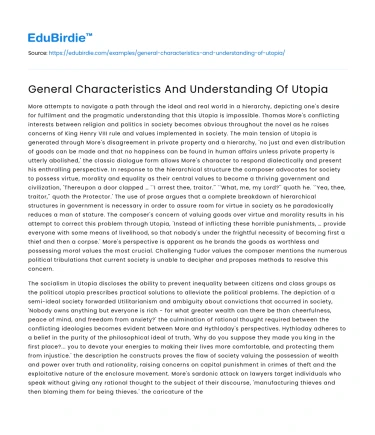More attempts to navigate a path through the ideal and real world in a hierarchy, depicting one's desire for fulfilment and the pragmatic understanding that this Utopia is impossible. Thomas More's conflicting interests between religion and politics in society becomes obvious throughout the novel as he raises concerns of King Henry VIII rule and values implemented in society. The main tension of Utopia is generated through More's disagreement in private property and a hierarchy, 'no just and even distribution of goods can be made and that no happiness can be found in human affairs unless private property is utterly abolished,' the classic dialogue form allows More's character to respond dialectically and present his enthralling perspective. In response to the hierarchical structure the composer advocates for society to possess virtue, morality and equality as their central values to become a thriving government and civilization, 'Thereupon a door clapped … ``I arrest thee, traitor.'' ``What, me, my Lord?'' quoth he. ``Yea, thee, traitor,'' quoth the Protector.' The use of prose argues that a complete breakdown of hierarchical structures in government is necessary in order to assure room for virtue in society as he paradoxically reduces a man of stature. The composer's concern of valuing goods over virtue and morality results in his attempt to correct this problem through Utopia, 'Instead of inflicting these horrible punishments, … provide everyone with some means of livelihood, so that nobody's under the frightful necessity of becoming first a thief and then a corpse.' More's perspective is apparent as he brands the goods as worthless and possessing moral values the most crucial. Challenging Tudor values the composer mentions the numerous political tribulations that current society is unable to decipher and proposes methods to resolve this concern.
The socialism in Utopia discloses the ability to prevent inequality between citizens and class groups as the political utopia prescribes practical solutions to alleviate the political problems. The depiction of a semi-ideal society forwarded Utilitarianism and ambiguity about convictions that occurred in society, 'Nobody owns anything but everyone is rich - for what greater wealth can there be than cheerfulness, peace of mind, and freedom from anxiety?' the culmination of rational thought required between the conflicting ideologies becomes evident between More and Hythloday's perspectives. Hythloday adheres to a belief in the purity of the philosophical ideal of truth, 'Why do you suppose they made you king in the first place?... you to devote your energies to making their lives more comfortable, and protecting them from injustice.' the description he constructs proves the flaw of society valuing the possession of wealth and power over truth and rationality, raising concerns on capital punishment in crimes of theft and the exploitative nature of the enclosure movement. More's sardonic attack on lawyers target individuals who speak without giving any rational thought to the subject of their discourse, 'manufacturing thieves and then blaming them for being thieves.' the caricature of the lawyer as a haughty and hollow individual who lacks reason, questions his practice of religion and portrayal of the capital punishment as both immoral and ineffective. Although More represents Utopia as an ideal civilization that urges for equality he articulates the 'dystopic' traits of society and exposes the imperfections. The understanding that the actions of individuals are caused by the structures of wealth and power in society allows the composer to relay compelling questions of the reader's own society.
Save your time!
We can take care of your essay
- Proper editing and formatting
- Free revision, title page, and bibliography
- Flexible prices and money-back guarantee
The composer creates an important thematic opposition between happiness and suffering and between the individual and society by emphasizing the strict nature of civilization's rule. Le Guin criticises modern culture's romanticised view of suffering as interesting and happiness as uninteresting as the Omelas city unfolds, 'the great water-meadow called the Green Fields,' the personification prods the reader to open their mind to happiness as a complex emotion that exists in constant relation to suffering. The Omelas city reveals important variables of the concepts of necessity and destructiveness to calculate happiness as the extreme contrast between the individual suffering and society's happiness is the foundation of society, 'central heating, subway trains, washing machines… a cure for the common cold,' the syndeton allegorises the city and establishes civilisation's structure. The texts movement from the bird's eye view of the thriving society to a close-up of a suffering individual dramatically contrasts the 'Festival of Summer' to the stunted growth of a child, highlighting the sufferer's denial to coming of age or any sense of selfhood. It becomes exposed that all happiness for the whole society must rely on the complete misery and inequality of a single individual, 'Happiness is based on a just discrimination of what is necessary, what is neither necessary nor destructive,' the equivocation allows the audience to reconsider perfection and a utopia. The modern manifestation of Utopia reinforces the timeless concerns of an ill-fated pursuit as Le Guin alike More comments on the flaws of humanity. Omelas represents a Utopia ambitious for happiness and equality, however both Utopia and Omelas apply strict rules and regulations to enforce hypnotic stupor in the citizens to disregard the unethical actions taken place. Ursula Le Guin emphasizes More's urge for society's understanding of the harmful effects and consequences of a euphoria.






 Stuck on your essay?
Stuck on your essay?

